Texas State Energy Conservation Office
Investigation: Making a PV Cell
Rise and shine! Class members collaborate to construct a photovoltaic solar cell with two semiconductor layers, as guided by this fabulous lab sheet. They test its output with an ammeter or galvanometer.
Curated OER
Solar Kit Lesson #3 Parts of a Solar Panel - Part I
A solar cell is similar to a rechargeable battery in many ways. Science lab groups connect each in a series circuit to run a mini motor and then compare and contrast them by answering questions and completing a Venn diagram. This is an...
Curated OER
Orienting a Photovoltaic Cell
By mounting a light bulb on a stand and a PV cell on another, physics apprentices experiment with the angle of incidence. Their goal is to determine the optimum angle for collecting solar energy. The use of a scientific calculator...
Curated OER
Series or Parallel?
Emerging electricians extend mental models of light bulbs and resistors in series and or in parallel circuits to include the connection of photovoltaic cells in arrays. They investigate open circuits, using a DC voltmeter, a light...
Curated OER
Solar Car Races: Build and retrofit for speed
If you have solar car kits for your junior high schoolers, they can experiment with photovoltaic cell angle, light intensity, and aerodynamic design to discover what makes their car move more quickly. This is a classic activity to use...
Curated OER
Using Photovoltaic Cells and Systems
This interesting document suggests nine different activities for shedding light on photovoltaic cells. A bit of background information is furnished for you, as well as many, many resource links. Listed for each activity are a learning...
Curated OER
Series or Parallel?
Physics classes that are studying electricity connect photovoltaic cells into both series and parallel circuits. Inquiry and critical thinking come into play as learners try to determine which circuit is more productive. They associate...
Curated OER
Maximum Power Point
Young scholars investigate energy using a photovoltaic cell. In this electricity lesson, students collect data from current-voltage and power-voltage curves to determine if photovoltaic systems have an advantage over conventional...
Curated OER
Photovoltaics and Solar Energy
Students experiment with photovoltaic cells and determine the energy use of their appliances. In this renewable energy lesson, students calculate the energy emitted by a photovoltaic cell through an inquiry-based lab. They keep track of...
Curated OER
Avoiding Carbon Dioxide Emissions from Burning Fossil Fuels
Students calculate stoichiometrically the amount of carbon dioxide that would be emitted from burning a mole of varios alkanes that comprise fossile fuels. If the energy released from burning a mole of these alkanes is known, then the...
Curated OER
Maximum Power Point
Students investigate how to optimize the power output of a photovoltaic cell using a home-made gnomon stand. They use data collected to create current-voltage and power-voltage curves and determine the "maximum power point," (MPP) at...
Curated OER
Photocells II: The Photoelectric Effect in Photocells
High schoolers discuss the principles of atomic structure that underlie the operation of a photovoltaic cell and explains how they apply to a photovoltaic cell's operation. An area of the classroom is staked off to represent a...
Curated OER
Orienting a Photovoltaic Cell
Learners explore the optimum angle for orienting a solar collector relative to the rays of incoming sunlight. They review equinoxes, solstices, and various locational ideas before students investigate using meters, light sources, and...
Curated OER
Waves, Sound, and Light
Ninth graders explain waves in terms of energy transfer and describe their basic types and characteristics. They solve mathematical problems involving wavelength and frequency. Students conduct experiments in reflection and refraction.
Curated OER
Maximum Power Point
Young scholars investigate how to optimize the power output of a photovoltaic cell using a home-made gnomon stand. They use data collected to create current-voltage and power-voltage curves to determine the "maximum PowerPoint," (MPP) at...
Science Education Resource Center at Carleton College
Serc: Investigation of Semiconductors
Using a web quest, simulations, and hands on activity, students will gain a basic understanding of semiconductors, diodes, and photovoltaic cells. In these activities students will learn how electrons migrate in semiconductors and...
TeachEngineering
Teach Engineering: Solar Power
In this activity, students learn how engineers use solar energy to heat buildings by investigating the thermal storage properties of some common materials: sand, salt, water and shredded paper. Students then evaluate the usefulness of...
Other
California Energy Commission: Solar Energy Science Projects [Pdf]
Four science projects in which students learn how solar energy works and how thermal energy is transferred and utlized in a solar air heater, a solar water heater, a solar hot dog cooker, and a solar cell.
TeachEngineering
Teach Engineering: Win That Bid! Selling Your Power Solution
A large part of engineering involves presenting products, concepts, and proposals to others in order to gain approval, funding, contracts, etc. The purpose of this activity is to fine-tune students' presentation skills while allowing...
CK-12 Foundation
Ck 12: Physical Science: Chemical and Solar Cells
[Free Registration/Login may be required to access all resource tools.] How chemical and solar cells work and produce an electric current.
US Department of Energy
U.s. Department of Energy: Energy Basics: Renewable Energy: Solar Energy
Find out about renewable energy resources using solar energy technologies. Learn about the use of photovoltaic cells and the capture of the sun's energy.








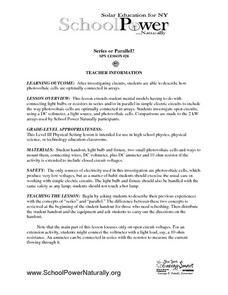

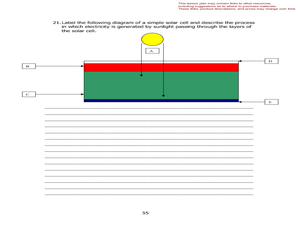

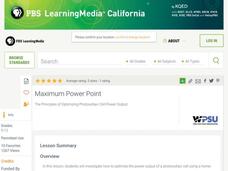

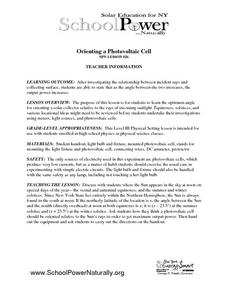


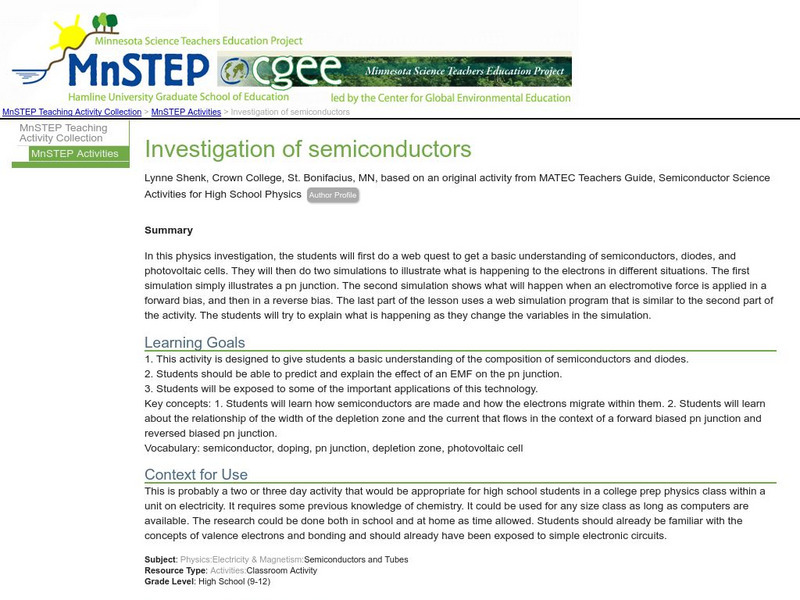

![California Energy Commission: Solar Energy Science Projects [Pdf] Lesson Plan California Energy Commission: Solar Energy Science Projects [Pdf] Lesson Plan](https://d15y2dacu3jp90.cloudfront.net/images/attachment_defaults/resource/large/FPO-knovation.png)


